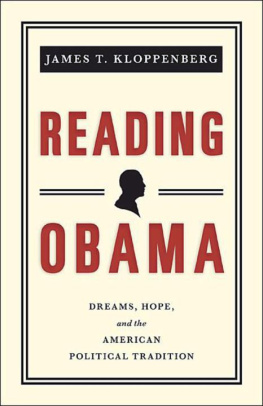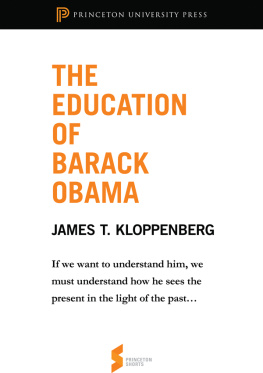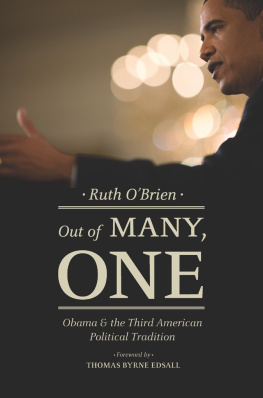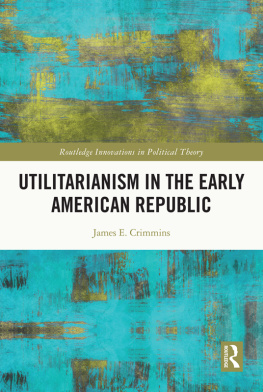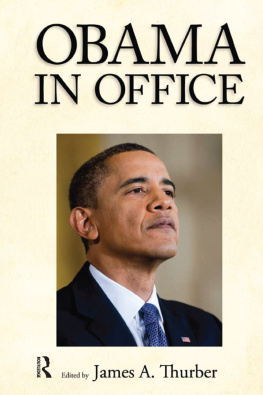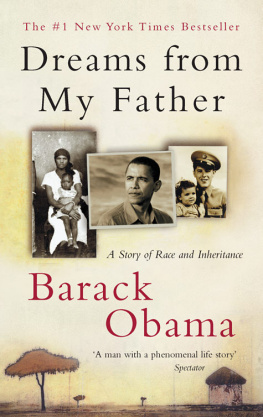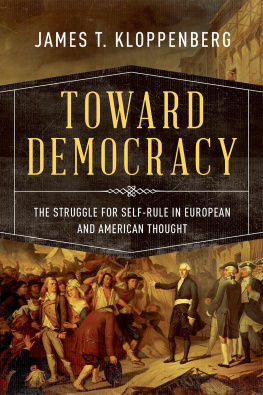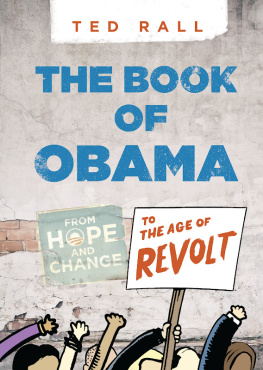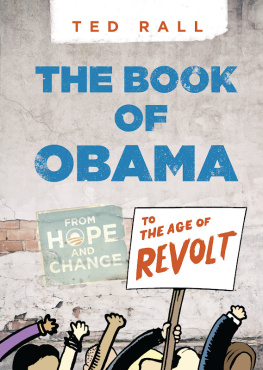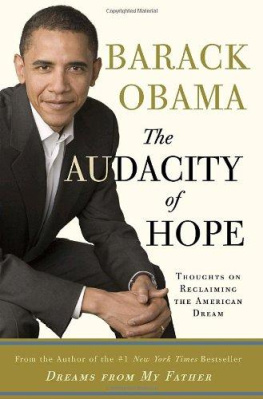James T. Kloppenberg - Reading Obama: Dreams, Hope, and the American Political Tradition
Here you can read online James T. Kloppenberg - Reading Obama: Dreams, Hope, and the American Political Tradition full text of the book (entire story) in english for free. Download pdf and epub, get meaning, cover and reviews about this ebook. genre: Politics. Description of the work, (preface) as well as reviews are available. Best literature library LitArk.com created for fans of good reading and offers a wide selection of genres:
Romance novel
Science fiction
Adventure
Detective
Science
History
Home and family
Prose
Art
Politics
Computer
Non-fiction
Religion
Business
Children
Humor
Choose a favorite category and find really read worthwhile books. Enjoy immersion in the world of imagination, feel the emotions of the characters or learn something new for yourself, make an fascinating discovery.
- Book:Reading Obama: Dreams, Hope, and the American Political Tradition
- Author:
- Genre:
- Rating:5 / 5
- Favourites:Add to favourites
- Your mark:
- 100
- 1
- 2
- 3
- 4
- 5
Reading Obama: Dreams, Hope, and the American Political Tradition: summary, description and annotation
We offer to read an annotation, description, summary or preface (depends on what the author of the book "Reading Obama: Dreams, Hope, and the American Political Tradition" wrote himself). If you haven't found the necessary information about the book — write in the comments, we will try to find it.
Reading Obama: Dreams, Hope, and the American Political Tradition — read online for free the complete book (whole text) full work
Below is the text of the book, divided by pages. System saving the place of the last page read, allows you to conveniently read the book "Reading Obama: Dreams, Hope, and the American Political Tradition" online for free, without having to search again every time where you left off. Put a bookmark, and you can go to the page where you finished reading at any time.
Font size:
Interval:
Bookmark:




James T. Kloppenberg
For Annie and Jay

ix
Chapter 1
Chapter 2
Chapter 3
Conclusion

 MERICA LOOKS DIFFERENT from the other side of the Atlantic. As I watched the twists and turns of the presidential campaign in the fall of 2008, I was following the drama from a distance. Living in England, lecturing to students at the University of Cambridge on the American political tradition, and trying in countless informal conversations to explain the unexpected emergence and election of Barack Obama, I began to see connections that had eluded me. Reading and rereading Obama's books, listening closely to his speeches, and thinking about the dynamics of American culture that made possible his rise to the presidency, I began piecing together the patterns traced in this book.
MERICA LOOKS DIFFERENT from the other side of the Atlantic. As I watched the twists and turns of the presidential campaign in the fall of 2008, I was following the drama from a distance. Living in England, lecturing to students at the University of Cambridge on the American political tradition, and trying in countless informal conversations to explain the unexpected emergence and election of Barack Obama, I began to see connections that had eluded me. Reading and rereading Obama's books, listening closely to his speeches, and thinking about the dynamics of American culture that made possible his rise to the presidency, I began piecing together the patterns traced in this book.
Barack Obama's intellectual and political persuasions emerged from a particular matrix, formed not only from his personal experience but also from the dynamics of American history. Obama's sensibility was shaped both by the period of his own intellectual formation the years between his birth in Hawaii in 1961 and his ascent to national prominence with his election to the United States Senate in 2004-and by the longer history that stretches from the Puritans to the present. Perhaps because I was thinking about Obama simultaneously in relation to my Cambridge lectures on the American past and my anxieties about the American future, I was alert to particular themes in his books Dreams from My Father and The Audacity of'Hope. I became convinced that these books illuminate certain neglected aspects of American history and point toward a very different vision of the present than I had seen in any of the commentaries on the election.
Barack Obama is the product of three distinct developments. First, it was the history of American democracy, the long, unfinished project stretching from the seventeenthcentury establishment of English colonies through the achievements of the civil rights and feminist movements, that produced the institutions and the cultural characteristics that made possible Obama's rise. Those same democratic institutions, and that same unfinished cultural project that we call American democracy, now constrain him as president. The immediate circumstances that led to Obama's election public dissatisfaction with the greatest economic collapse in the United States since the Great Depression of the 1930s have now become the single greatest obstacle impeding the realization of his most ambitious plans. The economic crisis resulted directly from policies of deregulation put in place during the preceding two decades by his predecessors Bill Clinton and George W. Bush. Yet many of the Americans who now hold Obama himself responsible for failing to restore prosperity also criticized the steps he took, the stimulus package and bank bailout, which most observers agree helped prevent an even deeper crisis. So incoherent is American pub lic debate that Obama's critics simultaneously blame him for an economic situation he did nothing to cause and oppose larger infusions of money into the economy through much greater government spending, the only option that might directly address the problem. The impasse in which the nation finds itself stems directly from the American people's limited access to power-and their equally limited access to responsible sources of information about how the American economy works. Because shrill, partisan simplifications dominate public debate, Obama's cautious, measured approach to economic reconstruction has infuriated the Right without satisfying the Left. The penetrating analysis that Obama offers in The Audacity of Hope explains the short-circuiting of American democracy in the twentieth century and illuminates the reasons why he faces such intractable political as well as economic problems as president. His conundrum, as he understands, is the product of long-term, unresolved problems in American history.
Second, America's principal contribution to the Western philosophical tradition, the philosophy of pragmatism that originated over a century ago in the writings of William James and John Dewey, has provided a sturdy base for Obama's sensibility. It has become a cliche to characterize Obama as a pragmatist, by which most commentators mean only that he has a talent for compromise or an unprincipled politician's weakness for the path of least resistance. But there is a decisive difference between such vulgar pragmatism, which is merely an instinctive hankering for what is possible in the short term, and philosophical pragmatism, which challenges the claims of absolutists-whether their dogmas are rooted in science or religion-and instead embraces uncertainty, provisionality, and the continuous testing of hypotheses through experimentation. The distinction between vulgar pragmatism and philosophical pragmatism is not always clear in practice because philosophical pragmatists can and sometimes do recommend what seems simply practical. But I will insist on the difference. The philosophical pragmatism of James and Dewey and their descendants has played an important part in shaping progressive politics since the early twentieth century. The close connection between the philosophy of pragmatism and the culture of democratic decision making illuminates crucial dimensions of Obama's thinking and the fierce opposition he faces.
If philosophical pragmatism informs Obama's political outlook, the history of pragmatists' engagement in politics also suggests the reasons why pragmatism may be particularly ill-suited to our own cultural moment. At a time when partisans left and right vie to proclaim rival versions of certainty with greater self-righteousness, the pragmatists' critique of absolutism and embrace of open-ended experimentation seems off-key, unsatisfying, perhaps even cowardly. Pragmatists have debated the political consequences of the philosophy for over a century. There is general agreement concerning the tight connection between philosophical pragmatism and democracy. Both are committed to open-endedness and experimentation. But there never has been nor, I think, can there be -a clear, explicit, singular lesson to be drawn from the philosophy of pragmatism for a particular political dispute. Indeed, the idea of such a formula is inimical to pragmatism, which is a method for testing beliefs in experience rather than measuring them against a yardstick of unchanging absolutes. Precisely because consequences matter to pragmatists, one can never say dogmatically, in advance, that one policy or another follows necessarily from the commitment to experimentation. Pragmatism is a philosophy for skeptics, a philosophy for those committed to democratic debate and the critical assessment of the results of political decisions, not for true believers convinced they know the right course of action in advance of inquiry and experimentation. Pragmatism stands for openmindedness and ongoing debate. The flexibility of pragmatist philosophy, which helps explain Obama's intellectual acuity and suppleness, may paradoxically undercut his ability to inspire and persuade the American electorate and the United States Congress at a time when strident rhetoric and unyielding partisanship have displaced reasoned deliberation and a commitment to problem solving.
Font size:
Interval:
Bookmark:
Similar books «Reading Obama: Dreams, Hope, and the American Political Tradition»
Look at similar books to Reading Obama: Dreams, Hope, and the American Political Tradition. We have selected literature similar in name and meaning in the hope of providing readers with more options to find new, interesting, not yet read works.
Discussion, reviews of the book Reading Obama: Dreams, Hope, and the American Political Tradition and just readers' own opinions. Leave your comments, write what you think about the work, its meaning or the main characters. Specify what exactly you liked and what you didn't like, and why you think so.

